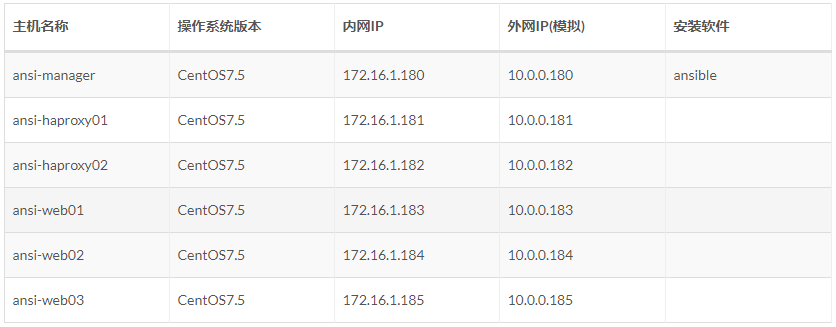Ansible Tests 詳解與使用案例 主機規劃 添加用戶賬號 說明: 1、 運維人員使用的登錄賬號; 2、 所有的業務都放在 /app/ 下「yun用戶的家目錄」,避免業務數據亂放; 3、 該用戶也被 ansible 使用,因為幾乎所有的生產環境都是禁止 root 遠程登錄的(因此該 yun ...
Ansible Tests 詳解與使用案例
主機規劃

添加用戶賬號
說明:
1、 運維人員使用的登錄賬號;
2、 所有的業務都放在 /app/ 下「yun用戶的家目錄」,避免業務數據亂放;
3、 該用戶也被 ansible 使用,因為幾乎所有的生產環境都是禁止 root 遠程登錄的(因此該 yun 用戶也進行了 sudo 提權)。
1 # 使用一個專門的用戶,避免直接使用root用戶 2 # 添加用戶、指定家目錄並指定用戶密碼 3 # sudo提權 4 # 讓其它普通用戶可以進入該目錄查看信息 5 useradd -u 1050 -d /app yun && echo '123456' | /usr/bin/passwd --stdin yun 6 echo "yun ALL=(ALL) NOPASSWD: ALL" >> /etc/sudoers 7 chmod 755 /app/
Ansible 配置清單Inventory
之後文章都是如下主機配置清單
1 [yun@ansi-manager ansible_info]$ pwd 2 /app/ansible_info 3 [yun@ansi-manager ansible_info]$ cat hosts_key 4 # 方式1、主機 + 埠 + 密鑰 5 [manageservers] 6 172.16.1.180:22 7 8 [proxyservers] 9 172.16.1.18[1:2]:22 10 11 # 方式2:別名 + 主機 + 埠 + 密碼 12 [webservers] 13 web01 ansible_ssh_host=172.16.1.183 ansible_ssh_port=22 14 web02 ansible_ssh_host=172.16.1.184 ansible_ssh_port=22 15 web03 ansible_ssh_host=172.16.1.185 ansible_ssh_port=22
Tests 概述
Tests 在 Jinja 中是一種評估模板表達式,並最終返回 True 或 False。Jinja 中就有自帶的 Tests 清單,具體地址如下:
http://docs.jinkan.org/docs/jinja2/templates.html#builtin-tests
tests 和 filters 的主要區別在於Jinja tests 用於比較,而 filters 用於數據操作,兩者在Jinja中有不同的應用。
與所有模板一樣,tests 總是在 Ansible 控制機上執行,而不是在任務的目標機上,因為它們測驗本地數據。
除了 Jinja2 tests 之外,Ansible還提供了一些 tests,用戶也可以輕鬆創建自己的 tests。
測驗字元串
若要將字元串與子字元串或正則表達式匹配,請使用「match」、「search」或「regex」過濾。
match:必須有開頭匹配
search:子串匹配
regex:正則匹配
示例:
1 [yun@ansi-manager ansi_tests]$ pwd 2 /app/ansible_info/ansi_tests 3 [yun@ansi-manager ansi_tests]$ cat tests_str.yml 4 --- 5 6 - hosts: manageservers 7 vars: 8 url: "http://example.com/users/foo/resources/bar" 9 10 tasks: 11 - debug: 12 msg: "matched pattern 1-1" 13 when: url is match("http://example.com/users/.*/resources/.*") # True 14 15 - debug: 16 msg: "matched pattern 1-2" 17 when: url is match("http://example.com") # True 18 19 - debug: 20 msg: "matched pattern 1-3" 21 when: url is match(".*://example.com") # True 22 23 - debug: 24 msg: "matched pattern 1-4" 25 when: url is match("example.com/users/.*/resources/.*") # False 26 27 - debug: 28 msg: "matched pattern 2-1" 29 when: url is search("/users/.*/resources/.*") # True 30 31 - debug: 32 msg: "matched pattern 2-2" 33 when: url is search("/users/") # True 34 35 - debug: 36 msg: "matched pattern 2-3" 37 when: url is search("/user/") # False 38 39 - debug: 40 msg: "matched pattern 3" 41 when: url is regex("example.com/\w+/foo") # True 42 43 [yun@ansi-manager ansi_tests]$ ansible-playbook -b -i ../hosts_key tests_str.yml # 註意查看執行
測驗版本比較
使用「version」,用於版本號比較。
「version」接受的運算符如下:
<, lt, <=, le, >, gt, >=, ge, ==, =, eq, !=, <>, ne
「version」也可以接受「strict」參數,這個參數預設值為「False」,如果設置為「True」則ansible會進行更嚴格的版本檢查:
{{ sample_version_var is version('1.0', operator='lt', strict=True) }}
示例:
1 # 判斷 ansible_python_version 版本是否 大於等於 2.7.3 2 [yun@ansi-manager ansi_tests]$ pwd 3 /app/ansible_info/ansi_tests 4 [yun@ansi-manager ansi_tests]$ ll 5 total 8 6 drwxrwxr-x 2 yun yun 35 Sep 12 15:14 file 7 -rw-rw-r-- 1 yun yun 209 Sep 12 15:08 tests_version.yml 8 [yun@ansi-manager ansi_tests]$ cat file/tests_version.conf.j2 # 涉及文件 9 # Jinja2 版本測驗 10 11 {% if ansible_python_version is version('2.7.3', '>=') %} 12 result True. ansible_python_version = {{ ansible_python_version }} 13 {% else %} 14 result False 15 {% endif %} 16 17 [yun@ansi-manager ansi_tests]$ cat tests_version.yml # 涉及的playbook文件 18 --- 19 # ansible tests Version Comparison 20 21 - hosts: proxyservers 22 23 tasks: 24 - name: "Tests Version Comparison" 25 template: 26 src: ./file/tests_version.conf.j2 27 dest: /tmp/tests_version.conf 28 29 [yun@ansi-manager ansi_tests]$ ansible-playbook -b -i ../hosts_key tests_version.yml # 執行
測驗子集和超集
關鍵字「superset」和「subset」,用於測驗一個列表是否包含或被包含於另一個列表
示例:
1 [yun@ansi-manager ansi_tests]$ pwd 2 /app/ansible_info/ansi_tests 3 [yun@ansi-manager ansi_tests]$ cat tests_set.yml 4 --- 5 # tests 子集和超集 6 - hosts: manageservers 7 8 vars: 9 a: [1,2,3,4,5] 10 b: [2,3] 11 tasks: 12 - debug: 13 msg: "A includes B" 14 when: a is superset(b) 15 16 - debug: 17 msg: "B is included in A" 18 when: b is subset(a) 19 20 [yun@ansi-manager ansi_tests]$ ansible-playbook -b -i ../hosts_key tests_set.yml # 註意查看執行
測驗列表真假
關鍵字「all」和「any」,用於檢查列表裡元素的真假,列表中所有為真或者任何一個為真。
all:一假則假
any:一真則真
1 [yun@ansi-manager ansi_tests]$ pwd 2 /app/ansible_info/ansi_tests 3 [yun@ansi-manager ansi_tests]$ cat tests_list.yml 4 --- 5 # tests 測驗 all any 6 - hosts: manageservers 7 8 vars: 9 mylist: 10 - 1 11 - "{{ 3 == 3 }}" 12 - True 13 myotherlist: 14 - False 15 - True 16 17 tasks: 18 - debug: 19 msg: "all are true!" 20 when: mylist is all 21 22 - debug: 23 msg: "at least one is true" 24 when: myotherlist is any 25 26 [yun@ansi-manager ansi_tests]$ ansible-playbook -b -i ../hosts_key tests_list.yml # 註意查看執行
測驗文件或目錄
用於測驗目錄、文件、軟連接、是否已存在、是相對路徑還是絕對路徑等等。
1 [yun@ansi-manager ansi_tests]$ pwd 2 /app/ansible_info/ansi_tests 3 [yun@ansi-manager ansi_tests]$ cat tests_path.yml 4 --- 5 - hosts: manageservers 6 7 vars: 8 # - mypath: /tmp/ 9 - mypath: /tmp/yum_hard.sh 10 - path2: /tmp/ 11 # - path2: /tmp/yum_hard_2.sh 12 13 tasks: 14 - debug: 15 msg: "path is a directory" 16 when: mypath is directory 17 18 - debug: 19 msg: "path is a file" 20 when: mypath is file 21 22 - debug: 23 msg: "path is a symlink" 24 when: mypath is link 25 26 - debug: 27 msg: "path already exists" 28 when: mypath is exists 29 30 - debug: 31 msg: "path is {{ (mypath is abs)|ternary('absolute','relative')}}" 32 33 - debug: 34 msg: "path is the same file as path2" 35 when: mypath is same_file(path2) 36 37 - debug: 38 msg: "path is a mount" 39 when: mypath is mount 40 41 [yun@ansi-manager ansi_tests]$ ansible-playbook -b -i ../hosts_key tests_path.yml # 註意查看執行
測驗任務執行結果
對任務執行結果進行測驗。
1 [yun@ansi-manager ansi_tests]$ pwd 2 /app/ansible_info/ansi_tests 3 [yun@ansi-manager ansi_tests]$ cat tests_result.yml 4 --- 5 - hosts: 172.16.1.180 6 7 ## 對如下3種情況一次測驗 8 tasks: 9 - shell: /usr/bin/foo 10 #- shell: /usr/bin/true 11 #- shell: /usr/bin/false 12 register: result 13 ignore_errors: True 14 15 - debug: 16 msg: "{{ result }}" 17 18 - debug: 19 msg: "it failed" 20 when: result is failed 21 22 # in most cases you'll want a handler, but if you want to do something right now, this is nice 23 - debug: 24 msg: "it changed" 25 when: result is changed 26 27 - debug: 28 msg: "it succeeded in Ansible >= 2.1" 29 when: result is succeeded 30 31 - debug: 32 msg: "it succeeded" 33 when: result is success 34 35 - debug: 36 msg: "it was skipped" 37 when: result is skipped 38 39 [yun@ansi-manager ansi_tests]$ ansible-playbook -b -i ../hosts_key tests_result.yml # 註意查看執行
———END———
如果覺得不錯就關註下唄 (-^O^-) !




